E3SM Hackathon Retrospective
From May 16 to May 27, Xylar Asay-Davis and Carolyn Begeman organized and launched the first E3SM Hackathon on CF compliance in E3SM’s ocean, sea-ice and land-ice components. These components were chosen because they share a common Model for Prediction Across Scales (MPAS) framework, allowing coordination of the work and sharing of code across components. Below is Xylar and Carolyn’s retrospective on the first E3SM Hackathon on CF Compliance.
“Overall, we believe the hackathon was a great opportunity for the participants to gain experience with MPAS Framework and yielded code improvements that would not otherwise have been undertaken. Based on our experience and feedback from the participants, we endorse future hackathons as a way of building capacity and camaraderie within the E3SM team. We had 8 participants: Carolyn Begeman, Holly Han, Darin Comeau, Charlie Zender, Jon Wolfe, Adrian Turner, Mark Petersen, and Xylar Asay-Davis. As we had hoped, there were participants with diverse levels of expertise in the MPAS components and framework, with at least one participant focused on each of the 3 MPAS components—MPAS-Seaice, MPAS-Ocean and MALI.
In our final meeting, we asked participants to reflect on what went well in the Hackathon and what we might improve upon for our next Hackathons. Participants all agreed that the Hackathon was successful in bringing people together to work on a project we wouldn’t have otherwise collaborated on. We felt that this work fostered positive attitudes and a supportive vibe among the team. We had outlined a set of granular tasks before the Hackathon began which allowed us to gather momentum early on. At the same time, including some of the design process within the Hackathon itself fostered good discussions and a sense of ownership of the resulting work. The Hackathon was an excellent introduction to the Sprint and Scrum processes, and allowed us to experiment with how best to adapt these business-oriented concepts to scientific research. We felt that everyone had reasonable expectations about what could be accomplished in two part-time weeks of work, and what the level of available knowledge was among participants.
Early in the Hackathon, we realized that fully supporting CF conventions in MPAS would be a much bigger task than we could take on in two weeks. We decided to focus primarily on two tasks in each component: updating units for CF-compliance and making both framework- and component-level changes to support standard fill values for invalid data. Smaller projects included adding new variable attributes to the MPAS framework for CF support and adding a CF-compliant time coordinate. The hackathon saw significant progress in each of these areas and across all 3 components, but most tasks were still in progress at the end of the two weeks. As a result, we agreed to follow up with 4 weekly meetings for one more month to keep momentum on these remaining tasks. After that, we transitioned Jira Tasks into Epics for longer-term support in coordination with the E3SM Infrastructure Team.
We also learned a great deal from the Hackathon that could lead to improvements in future E3SM Hackathons. We will discuss two of the lessons learned here but would be eager to chat with anyone planning a future hackathon about the full list. Most prominent was that 2 hours of check-in and collaborative work time was not enough time for the Hackathon to realize its full potential. It was too easy for everyone to treat the hackathon as a side project and to try to take it on in addition to a full work week. Instead, we recommend setting aside 4 hours per day for the 2 weeks, including more collaborative code development time and social time. A second potential improvement would be if the lecture-style introductory material that we included in this Hackathon could instead be a longer, tutorial-style introduction in future Hackathons. Those with less familiarity with the code(s) involved in the Hackathon would benefit more from one or more hands-on introductory sessions than from lectures. Tutorials would also likely be of greater benefit to the broader E3SM community. The trade-off is, of course, that tutorials typically require considerably more preparation time from the presenter.
All in all, the first hackathon was a resounding success and we highly recommend this type of activity as a means to build team cohesion and resolve outstanding issues that can become tractable through a concerted group effort”.
Reference
- E3SM Hackathons
- Hackathon: CF Compliance in MPAS (E3SM internal link)
Contact
- Xylar Asay-Davis, Los Alamos National Laboratory
- Carolyn Begeman, Los Alamos National Laboratory
This article is a part of the E3SM “Floating Points” Newsletter, to read the full Newsletter check:



